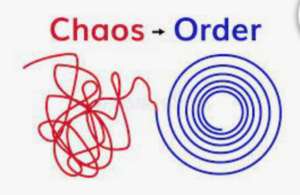Running a service-based business can often feel like a juggling act, with countless tasks, client requests, and operational challenges demanding your attention. Whether you have been in business for awhile, or are brand new, without clearly defined systems, you will eventually start to scramble and waste valuable time and money.

Without efficient processes in place, chaos can quickly become overwhelming, leading to missed deadlines, dissatisfied clients, and overwhelmed employees. In this blog post, we will explore how to transform your business from a state of chaos to one of order by implementing effective processes. By doing so, you can streamline operations, improve client satisfaction, and ultimately boost your bottom line.
Identify Key Business Processes:
The first step in creating efficient processes is to identify the key areas of your business that require structure and organization. This could include lead generation, client onboarding, project management, invoicing, or any other processes specific to your industry. Take the time to assess which processes are currently causing bottlenecks, consuming excessive time and resources, or leading to client dissatisfaction. You can’t do these all at once, so prioritize which areas are bogging you down the most, and start there.
Document Standard Operating Procedures (SOPs):
Once you’ve identified the key processes, it’s essential to document standard operating procedures (SOPs) for each one. SOPs serve as a roadmap that outlines the necessary steps and best practices for executing a task or process. By creating detailed SOPs, you provide your team with clear instructions on how to perform their duties consistently and effectively. This helps maintain quality standards, reduces errors, and ensures that everyone is on the same page.
Streamline Communication Channels:
Effective communication is vital in any business, especially service-based ones. A lack of clear communication can lead to misunderstandings, delays, and frustrated clients. Implement tools and channels that facilitate seamless communication among team members, such as project management software, messaging apps, or collaboration platforms. Clearly define communication protocols, establish regular check-ins, and encourage open dialogue to keep everyone informed and aligned.
Automate Repetitive Tasks:
Identify repetitive tasks that consume valuable time and consider automating them. Automation tools can help streamline processes and free up your team’s time for more high-value activities. For example, you can automate email responses, appointment scheduling, or invoice generation. Embrace technology and explore software solutions tailored to your industry to identify opportunities for automation.
Continuously Evaluate and Improve:
Efficient processes are not set in stone; they require ongoing evaluation and improvement. Regularly review your processes to identify areas for optimization. Seek feedback from your team and clients to gain insights into pain points and areas that need improvement. Stay updated with industry trends, best practices, and emerging technologies to ensure your processes remain efficient and up to date.
Invest in Training and Development:
Efficient processes are only as effective as the people executing them. Invest in training and development opportunities for your team to enhance their skills and knowledge. This will empower them to carry out their responsibilities more efficiently and contribute to the overall success of the business. Encourage continuous learning, provide resources, and foster a culture of professional growth.
Creating efficient processes is an essential aspect of running a successful service-based business. By identifying key processes, documenting SOPs, streamlining communication, automating repetitive tasks, and continually evaluating and improving, you can transform chaos into order. By implementing these strategies, you’ll streamline operations, enhance client satisfaction, and create a solid foundation for growth. Remember, efficiency is not a one-time achievement but an ongoing commitment to excellence.
